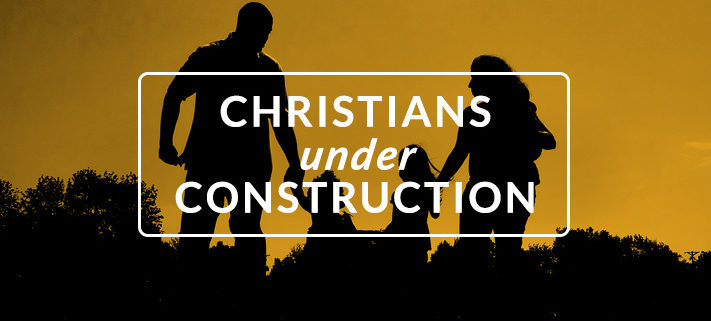Prayer answered
Prayer answered
Can anything good come from falling into the lake? Here’s a story that says it can!
Frederick A. Kogler
Recently “Rose Garden Jordan”—that’s what I call my grandson since he helped me plant and establish a rose garden a few years back—and I undertook a major task together. We headed north to our family cabin for a few days to do some work and try our hands at some early spring crappie fishing.
A fall into the lake
Our task was to put down a floating floor in our cabin kitchen, replacing an aged surface that Grandma found impossible to keep clean. We had enlisted the help of my longtime friend Al, who was an experienced carpenter and wood worker and a “year rounder” in northern Minnesota. Both Al and I, however, are getting to the point where our newest friend “Arthir Ritus” (AR) keeps us company by interfering with what we think we should do and what we are able to accomplish. Getting down and crawling around on hard surfaces is more difficult than you might think when you’ve gotten to be our age and have AR as your constant companion.
Over the course of ten hours spread over two days, we finished cleaning out the kitchen down to the subfloor, cutting and fitting a subfloor, and installing the new planks that make up the new floating floor. Without Jordan, it would have taken us old guys a full week to get the job done.
Now it was time to go fishing! Yahoo! Whoopee! I could hardly wait.
We minnow fish in shallow water during the crappie spawn. Earlier Jordon and I had picked up our minnies and an ice cream cone at the bait shop. The bait had been carried in an oxygenated bag and transferred to our minnow bucket. We bailed the boat, selected our tackle carefully, put on our life preservers, and calculated that we had a couple of good hours for fishing. Jordon got down into the boat with the grace of a young athlete, and then it was my turn. But when I stepped down into the boat, it had lost its moorings and moved away from the dock. There I was, one foot in the boat and one foot on the dock. I ended up taking my first swim of the summer season!
When I realized I was only waist deep in the lake, I stood up, embarrassed, chilled, and soaked with my glasses still on my face. Jordon assessed the situation with typical wide-eyed surprise: “Well, okay then!” Then he pointed out that I had spilled the minnow bucket in my boarding attempt and our bait was swimming all over the boat floor. So still standing waist deep in the lake, I asked for the minnow scoop, and we recaptured all our minnows and deposited them in the bucket.
A ruined cell phone
It was right about then that I remembered that I had pocketed my cell phone earlier. I wanted to have it with me either to take a picture or to call someone in the case of an emergency. Well, you may have guessed it already. The expensive smartphone was deader than an old rusty nail. We decided to go fishing without it. Wet from the middle of my chest down, I owed it to my number-one helper to drown a few minnows. We had great success, catching our limit that night but losing the use of my phone.
In the days following I tried everything to fix it: my wife’s old hairdryer, some long-grain rice in a ziplock plastic bag . . . I even pondered the feasibility of self repair following the directions of some YouTube videos.
But I finally yielded to the temptation to return to the cell phone store to look into repair or replacement. After all, I reasoned, my cell phone had become an occupational necessity and I couldn’t live without it! All I could see in this episode so far was dollar signs and extreme frustration.
As I was driving to the store my frustration was quieted by the Spirit-guided remembrance of Romans 8:28. “And we know that in all things God works for the good of those who love him, who have been called according to his purpose.”
An amazing opportunity
As I walked into the store the manager greeted me with a smile on his face and a clipboard in his hand. After I explained what had happened, he passed me off to one of his sales consultants. As I re-explained my circumstance, all the time waving my dead smartphone in the air, I noticed that the consultant seemed to have an unusually quiet manner and somewhat of a dark look on his face.
It didn’t take long to decide on a new phone, a watertight case, and a contract plan. In the process of the financing and setup, he asked me, “What do you do for a living?” I explained briefly that I was a pastor serving a small congregation, and, yes, I enjoyed my work very much and found it extremely satisfying.
I did not expect the next question: “Do you really believe in God and the power of prayer?”
I answered quickly, “Yes, I certainly do. But why do you ask?”
In the next few minutes he poured out his story. Right there in front of the others waiting for his attention, he explained that he had wronged his wife, offended his son, and crossed the line of marital faithfulness. He continued by stating that today was to be his last day at work—and on earth! He added that when he got up this morning he had prayed to Jesus to send him some message, some messenger to help him understand and to cope.
By this time my heart was racing. I prayed in my mind, “Lord give me the words. Give me the wisdom to share your love.”
I started, “I think I might be the answer to your prayer.” Then I launched into a gospel presentation of Scripture and accumulated life experience that flowed so easily and readily that I didn’t have to pause. As I spoke, I sensed a small group gathering closer to hear what was being said. I told him about Jesus. I told him about forgiveness. I told him about sin and brokenness. I told him about God’s love. The passages flowed spontaneously as each idea was expressed. One guy in the group standing near even uttered a quiet “Amen.”
Then the store manager stepped in, and, with a clearing of his throat, the window of opportunity was closed.
But not quite. His sales consultant walked me to the door and then accompanied me to my car. Thanking me profusely, he dropped two of his business cards in my bag and said, “Please call me sometime and thanks again!”
I can only add my “Praise the Lord!”
And remember it all happened because I fell in the lake!
Fred Kogler is pastor at Emmanuel, Hudson, Wisconsin.
SUBMIT YOUR STORY
Do you have a manuscript, idea, or story from your own life you’d like to share for use in Forward in Christ or on wels.net? Use our online form to share it to our editorial office for consideration.
SUBSCRIBE TO FORWARD IN CHRIST
Get inspirational stories, spiritual help, and synod news from Forward in Christ every month. Print and digital subscriptions are available from Northwestern Publishing House.
Author: Frederick A. Kogler
Volume 102, Number 5
Issue: May 2015
Copyrighted by WELS Forward in Christ © 2021
Forward in Christ grants permission for any original article (not a reprint) to be printed for use in a WELS church, school, or organization, provided that it is distributed free and indicate Forward in Christ as the source. Images may not be reproduced except in the context of its article. Contact us





